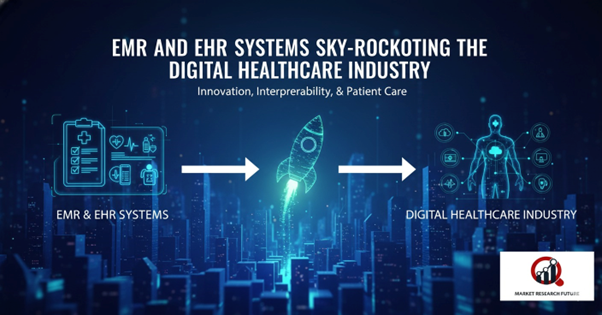EMR and EHR Systems Sky-Rocketing the Digital Healthcare Industry

The Introduction to the Digital Healthcare Market
The global digital healthcare market is subject to significant changes and evolution due to the growing integration of cutting-edge technologies like AI, IoT, and ML. The size of the sector reached USD 270.46 billion in 2024, which is likely to reach USD 2011.76 billion by 2035. The advancement of the sector will occur at a CAGR of 20.01% through 2035.
Digital transformation is revolutionizing patient care by enhancing efficiency, saving time for both patients and healthcare providers, and increasing overall productivity. Additionally, digital health enables informed decision-making.
An improved patient experience was cited as the most desired outcome of digital transformation by 92% of respondents in a recent Deloitte survey of health system providers.
In recent years, the combined power of the internet, data science, connected devices, and AI has elevated productivity and quality in the pharmaceutical and healthcare sectors. AI, machine learning (ML), cloud computing, and robotic process automation (RPA) have accelerated drug research and diagnostic testing.
Key advantages include India’s market size, potential for R&D, medical tourism, and public health systems. Digital healthcare also enables remote delivery of primary and customized care through video consultations and telehealth services.
Automation
Automation has become one of the most effective tools in healthcare. It benefits drug manufacturers by improving production safety and quality. Automation algorithms also enhance microbiological studies by increasing productivity, analyzing specimens accurately, and improving laboratory research outcomes.
Connected Ambulance
Connected ambulances transmit patient data collected via wearables, sensors, and HD cameras to hospitals in real time. This ensures doctors have all necessary information before the patient arrives, allowing faster and more precise interventions.
Solutions for On-demand Healthcare
The mobility of modern society has prompted healthcare providers to adopt cutting-edge technologies. On-demand healthcare allows doctors to offer services based on their expertise and availability, adapting to patient needs efficiently. Patient portals, healthcare wearables, and telemedicine platforms further enable convenient, time-efficient care.
Moulding Healthcare with COVID-19
The COVID-19 pandemic accelerated the adoption of digital healthcare, shifting consultations from clinics to virtual platforms. Patients have acclimated to telemedicine, AI chatbots, and virtual wellness assistants.
Smart devices now allow real-time home monitoring of vital parameters like heart rate and blood oxygen levels, reducing the need for multiple hospital visits.
Regional Analysis
The North American digital healthcare market is currently the largest, driven by extensive EMR/EHR adoption, advanced IT infrastructure, and supportive government policies. The United States leads the market, with initiatives like the Health Information Technology for Economic and Clinical Health (HITECH) Act encouraging digital record implementation.
Europe follows closely, particularly in countries like Germany and the UK, where government-backed digital health strategies and high healthcare expenditure drive adoption.
The Asia-Pacific region is experiencing rapid growth, led by China, India, and Japan, fueled by increasing investments in healthcare IT, telemedicine, and mobile health applications.
Latin America and the Middle East & Africa are emerging markets with growing demand for accessible and cost-effective healthcare solutions. Overall, regional expansion is driven by increasing digital literacy, healthcare modernization, and the need for efficient patient care delivery.
Conclusion
The digitization of healthcare is a continuous journey, with medical professionals driving innovation and creating value. Leaders in digital health are pivotal to the sector’s growth and the widespread adoption of technology-driven solutions.

Leave a Comment